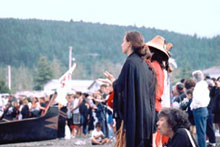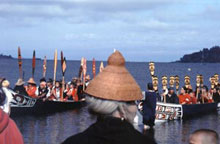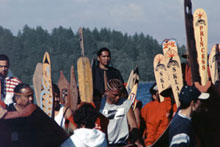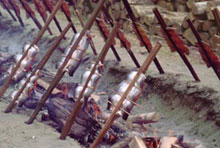
Welcoming is conducted formally. It is a time to be proud and generous as a host and respectful as a visitor. Makah dancers Kristin Pascua, Polly McCarty and Rebecca Monette (both behind Kristin) and Rita Markishtum (lower right) greet the travelers. (Photo: Robert Steelquist)
Welcoming
By Robert Steelquist
Education Coordinator
Olympic Coast National Marine Sanctuary
On a canoe journey, no one is self-sufficient. An odyssey of days or weeks covering hundreds of miles means depending on the hospitality of others. In the days when canoes were the only option of travel approaching the village of others often required diplomacy—old conflicts might be renewed or sovereign territory violated. Yet canoe journeys were guided by a code of hospitality on the part of the host and respect on the part of the visitor. The needs of the guest were well understood—safe harbor and nourishment. Likewise, the guest recognized the prerogatives of his hosts—permission to land on the locals’ home territory and the offer of food and rest. Today, as then, the essential protocols that signify the open hand of welcoming persist.

A great raft of canoes forms up facing the shore. Welcomers, speakers and respected leaders from the host tribe, await the visitors. “Paddles up” signifies peaceful intent. Melissa Peterson wears the traditional cedar bark hat. (Photo: Jenny Steelquist)
Across different languages, nationalities, tribal and family identities there exists a common form of greeting—the Welcoming. It begins as the first silhouettes appear on the horizon. Friend or foe? What is their nation? Over the sound of waves on the beach you hear a faint song, sung in cadence with the paddle strokes. The canoe form becomes discernable. Gradually, the people become recognizable from the lines of the canoe, the forms of the pullers and the song.
A crowd gathers on the beach to meet the visitors. A line of dancers forms around a knot of official greeters. Empowered by hereditary, spiritual or political authority, the greeters await the canoes. The canoe skipper and crew show their discipline, pulling neatly and singing in strong voices. Paddles rise and fall in unison as the visitors near the beach. On command, all the paddles point up as the sleek vessel cuts the water, coasting toward the beach, stopping just off shore. “Paddles up” signifies that the stranger comes in peace.
On a journey of many canoes, the crews may arrange to arrive in set order, those traveling the greatest distance first, followed by those who began their journey nearer, and finally those nearest. The canoes circle and form up in a great raft bobbing as one, a sea of faces and paddles. At the right time, the first captain calls ashore to the greeters. He or she announces the name of the people, their home village and the name of the canoe. In a speech rehearsed well in advance, in the Native language or English, or both, the speaker offers the respect of the crew to the host, invoking names of important families, hereditary chiefs and political leaders. The speech may recount times they have spent together with the host, acknowledgement of shared experience, like whale hunts or canoe blessings. The speech will both flatter the host’s known generosity or remind the host of the traveler’s past generosity within their own territory. The speech ends with a simple request: “We wish to come ashore. We are tired and hungry, and we wish to be together, to share songs and good times.” Falling silent, the speaker awaits the words of the greeter.

Al Charles, canoe carver and skipper of the Lower Elwha Klallam, makes a speech in which he acknowledges his tribe’s ties to the hosts and requests permission to come ashore for rest, food and celebration. (Photo: Robert Steelquist)
In following the protocol, the hosts respond in kind. The greeter also recounts shared experiences, past favors, family ties, unique bonds between the villages and the canoes, like previous journeys or hunts. With a voice resonating over the lapping of waves and the bumping of canoes, the greeter grants the request: “You are welcome to come ashore.” Sometimes, in reply, the canoe crew will begin a song to acknowledge the generosity of the host tribe and greeters.
And so, through the entire raft, canoe after canoe requests permission and is granted the privilege of setting foot on the beach of the host village. Men and women of the tribe will assist the canoes, pulling the heavy vessels up the beach, escorting them to camping places or waiting food. The formality breaks up into laughter and hugs, shouted greetings and jokes—the common human expression of companionship, of relief after traveling, of looking up old friends and seeing distant family.
Soon, formality again reigns. Rested and fed, the protocol of the Potlatch commences. Keeping the promises they made on the beach, the hosts will gather all the visitors in a community hall or gym for song sharing, drumming and exchanging gifts and speeches. Into the night, you hear the drums and the songs and you fall asleep exhausted as the words and melodies and rhythms of centuries hang in the night air.

In the traditional fashion, Quinault blueback (sockeye) salmon are slowly cooked over alder wood fires. The potlatch is the host’s display of generosity. None of the visitors will be hungry for long. After the feast, dancing and gift-giving will proceed into the night. (Photo: Robert Steelquist)
It is one of the deeply tragic ironies of history that European explorers failed to comprehend the protocol of welcoming and tradition of generosity deeply embedded in Northwest Coast Native culture at the time of historic contact. The arrival of strangers on the shore was a common occasion. Differences of language and dress were accounted for in the welcoming protocol. Enemy and friend could be accommodated in dignity and generosity. In the common gesture of an open hand, a polite request and the display of humble need, Europeans might have built on the common bond they had as seafaring people. As guests, and not as conquerors, the newcomers might have found their place in “the New World” as co-inhabitants on these shores. Five hundred years of history will not be unwritten, but the lessons still apply. We are all here together. Our lives are now inextricably intertwined. In a grand sense, we share the shores and we share the canoe. And as we learn together, we rediscover a basic language—a protocol—both humble and generous, of journeying together.
Sign up for the Ocean Explorer E-mail Update List.








